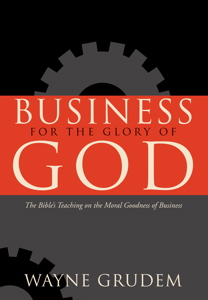A Brief Book Summary from Books At a Glance
About the Author
Wayne Grudem (PhD, University of Cambridge) is research professor of theology and biblical studies at Phoenix Seminary. He is the former president of the Evangelical Theological Society, a cofounder and past president of Council on Biblical Manhood and Womanhood, and has published over 20 books.
Introduction
Wayne Grudem desires to establish in this book the inherent moral goodness of business. Contrary to popular opinion in the church, many business activities are intrinsically good and provide a way for Christians to glorify God. This book is concerned to look at business in itself — apart from the ways business can aid the work of the church.
Two preliminary points must frame the arguments that follow: the imitation of God and the presence of sin. It often goes unnoticed that one of the primary ways believers can glorify God is through imitating his character. As people created in God’s image and likeness, we find our deepest joy and satisfaction through exemplifying the attributes of God. This truth should permeate every aspect of our lives. However, living in a fallen world provides countless opportunities to sin. God is never glorified when we disregard his Word. Imitation of God must align with God’s moral law found in the Scriptures. This book does not attempt to solve complex ethical situations; it is about the virtue of the essential components of business.
Table of Contents
Preface
Introduction: A Neglected Way to Glorify God
Chapter 1 Ownership
Chapter 2 Productivity
Chapter 3 Employment
Chapter 4 Commercial Transactions
Chapter 5 Profit
Chapter 6 Money
Chapter 7 Inequality of Possessions
Chapter 8 Competition
Chapter 9 Borrowing and Lending
Chapter 10 Attitudes of the Heart
Chapter 11 Effect on World Poverty
Summary
Chapter 1: Ownership
The idea that owning any property is “greed” is wrongheaded and unbiblical. The commandment “You shall not steal” (Ex. 20:15) shows that God condemns taking something that belongs to another, thus approving of personal ownership of possessions. In fact, owning something is one of the ways we imitate God’s sovereignty over the world, and as we care for our possessions we also imitate other attributes of God such as his freedom, wisdom, creativity, and kindness. Many Christians rightly recognize that ultimately God owns everything, and we are simply stewards over what he has entrusted to us. What should we do with our possessions? The Bible gives much wisdom in this area. One of the greatest ways to glorify God with our possessions is to give them away. This displays trust in God and love for those in need. We can also use our resources to help “subdue the earth,” perhaps by creating ways to be more productive for the benefit of our fellow human beings. There are also times when we should simply enjoy our possessions with thanksgiving to God; other times it is appropriate to save them for the days ahead.
Ownership is not wrong, but it comes with many temptations to sin. There is a strong temptation to pride and idolatry — thinking highly of ourselves for what we own and trusting in riches over God. It is also possible to use possessions to live a life of luxury and self-indulgence, ignoring the needs of others and oppressing the poor and disadvantaged. In many parts of the world, corrupt governments and power-hungry elites either prohibit or make it nearly impossible for many people to own property. These arrangements are evil and destroy the ability of people to glorify God through personal ownership. However, the misuse of possessions does not make ownership intrinsically evil; it is a gift from God for which we should be grateful.
Chapter 2: Productivity
The cultural mandate found in Genesis 1:28 and 2:15 is prime evidence of the moral goodness of productivity. One of God’s original purposes for mankind was to subdue the earth — meaning to make it useful for their own advantage. This includes producing agricultural products, along with “housing and works of craftsmanship and beauty, and eventually building’s, means of transportation, cities, and inventions of all sorts.” The manufactured products we have today are cause for much praise….
[To continue reading this summary, please see below....]The remainder of this article is premium content. Become a member to continue reading.
Already have an account? Sign In
Buy the books

Business for the Glory of God